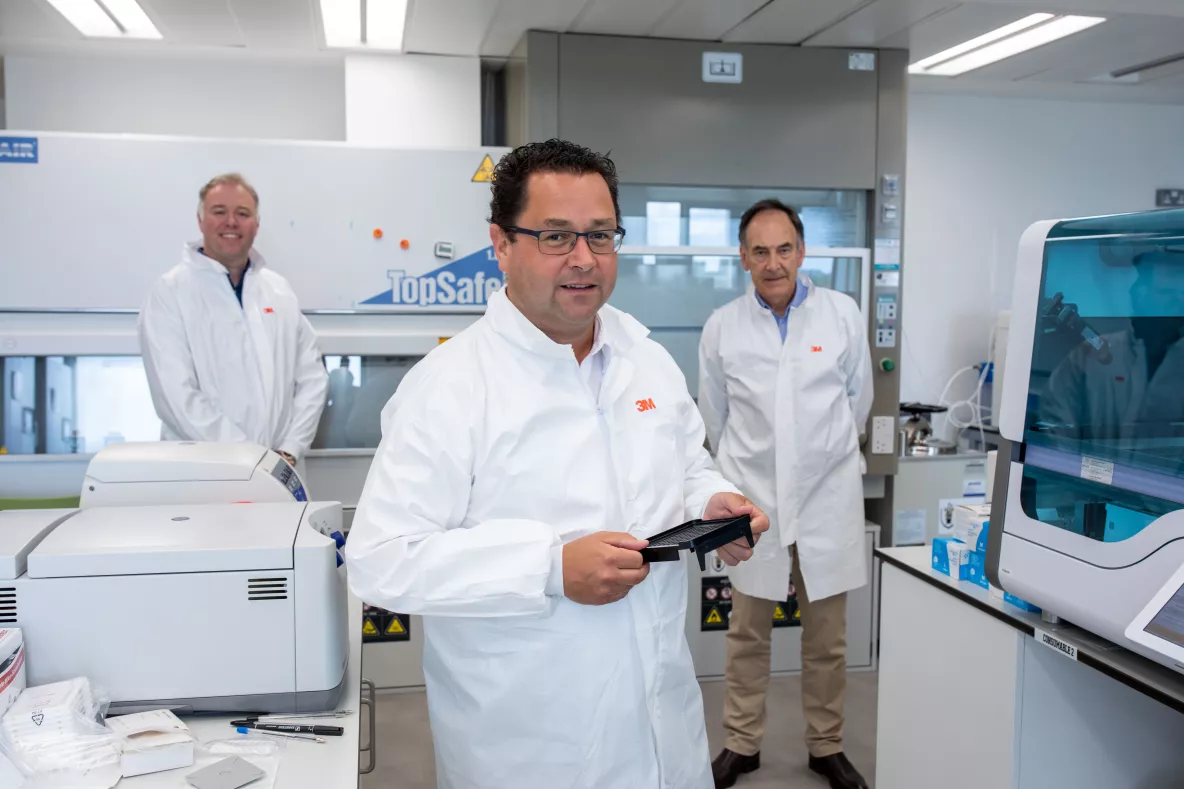
Two projects based at University of Limerick are to share in a major investment by the State in new COVID-19 research.
Minister for Business, Enterprise and Innovation, Heather Humphreys has this Tuesday announced an investment of €1.4 million in 11 projects under the SFI-coordinated research and innovation response to the pandemic.
The investment builds on previous funding and complements the existing research work underway in higher education institutions across the country.
Two UL projects have been funded in the latest round - COVIGILANT, led by Lero, the SFI Research Centre for Software based at UL and RAPID: Rapid Advanced Production Responses to Frozen Supply Chains in Hospitals, led by the Confirm SFI Research Centre in Smart Manufacturing at UL – receiving more than €430,000 in total between them.
Minister Humphreys said: “I am delighted to announce this further investment in research and innovation related to COVID-19. These projects will address immediate priorities to assist us with the challenges we face as we seek to reopen our society and economy, and get the country running again.
“Research and innovation from our higher education institutions, in collaboration with our health services and industry, can support us in delivering solutions to the many challenges the pandemic has thrown at us. Working together we can find solutions and move forward towards recovery.”
RAPID: Rapid Advanced Production Responses to Frozen Supply Chains in Hospitals is led by Professor Leonard O’Sullivan, School of Design, UL and a Funded Investigator in Confirm Research Centre, received €239,614.70.
The project will overcome blocked or frozen supply chains in healthcare in a time when COVID-19 has disrupted and threatened supply chains around the world.
“When this happens in healthcare, it can cost lives,” explained Professor O’Sullivan. “The RAPID project will identify problems being experienced in Irish healthcare as a result of insecure supply chains, and design ways to overcome these problems using 3D printing and smart manufacturing.
“This project is responding to the immediate needs within the healthcare system, in particular in responding to different needs at different stages as they arise. This is particularly important as we move into the next phase of the pandemic which will bring with it new challenges regarding medical supplies and ways of treating patients,” he added.
The design team will engage directly with hospital workers to identify the problems caused by disrupted supply chains, and will develop ways to overcome these problems using 3D printing and other smart manufacturing technologies developed with the Confirm Centre and its wider industrial network.
COVIGILANT - Evidence to inform Ireland’s digital contact-tracing strategy, is led by Dr Jim Buckley at Lero, with his colleague Professor Liam Glynn at UL’s School of Medicine and Professor Derek O’Keeffe of NUI Galway. It received €192,263.50.
It will gather evidence to inform and optimise Ireland’s digital contact-tracing strategy and practice. The research will carry out large-scale public surveys to capture end-user perceptions of digital contact tracing, to identify barriers people may have to using contact-tracing apps and thus, to tailor information campaigns. It will also review a range of existing contact-tracing apps, to determine best practice and identify design modifications to inform updates to the HSE’s chosen digital contact-tracing solution.
Dr Buckley said: “Contact tracing can play a huge part in the ongoing effort to minimise the spread of the virus nationally and this project aims to inform best-of-breed digital support for that contact-tracing effort.”
Commenting on the awards, Professor Mark Ferguson, Director General Science Foundation Ireland and Chief Scientific Adviser to the Government, said: “The COVID-19 Rapid Response Research and Innovation programme exemplifies the high international standards, agility and responsive nature of our research community. This programme has been delivered by a high level of interagency and higher education institutional collaboration.
“We are stronger when we work together, and we will continue to collaborate with our colleagues to share the latest knowledge, developments and innovations, and to support ideas that will generate solutions to the many challenges presented by the COVID-19 pandemic.”
Minister for Training, Skills, Innovation, Research and Development, John Halligan added: “I am proud of how the Irish research community has mobilised so rapidly and intensively in focusing on this issue. Ireland’s investment in research allows us to move rapidly and coherently in a crucial area such as Covid-19 research. This will have benefits for Ireland but also for the wider world.
“This could not be done without our ongoing long-term investment in our higher education and research and shows the need for continuing investment in these areas at all times.”
The Rapid Response Research, Development and Innovation programme was established by Science Foundation Ireland, Enterprise Ireland, IDA Ireland, the Health Research Board and Irish Research Council. This announcement builds on the previous investment of €3.5 million across 26 projects and the ongoing work in universities and institutes of technology that are adding significantly to the national effort to combat the virus and assist us on the path to recovery. More than 500 applications were received by the agencies.
All of the projects funded have been internationally peer reviewed at the assessment stage.
For more and a full list of funded projects, see here.